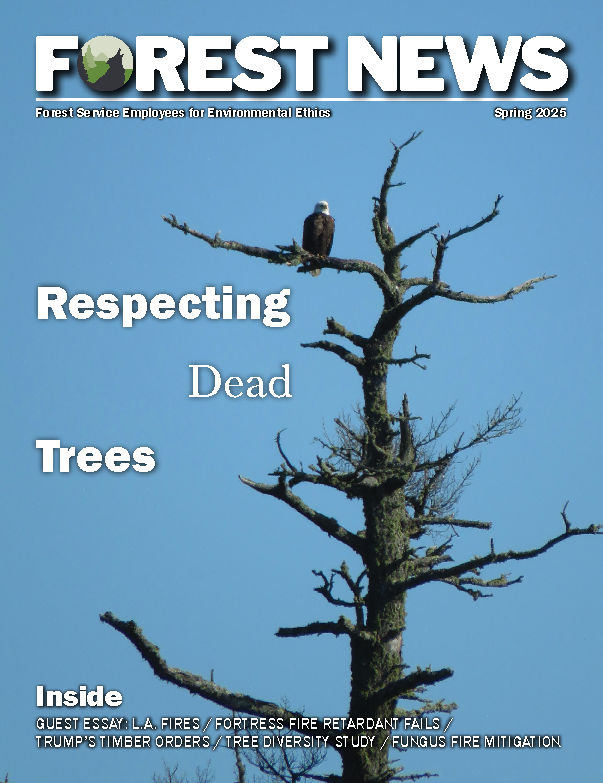Dear FSEEE Supporter,
This has been a trying year.
Those who care passionately about our public lands have endured a bevy of broadsides threatening the values we hold so dear. Attacks on national monuments, giveaways to private interests, efforts to undo bedrock environmental protection laws—the first months of the Trump administration and a Republican-controlled Congress have threatened five decades of environmental victories.
With your help, FSEEE will see our National Forests safely through this tumultuous time of Trump. With your help, we’ll protect the brave public servants who stand up to their bosses in carrying out their duties of protecting our shared natural heritage for generations to come.
Please consider making a special year-end contribution to FSEEE. We need your help now more than ever.
Let me share with you some of our accomplishments in 2017, as all of us at FSEEE have fought tooth and nail to protect our public lands.
Stopping Inappropriate War Games
It’s not easy to stop the U.S. Navy. But we’re working hard to do just that.
For years, the Navy has tried to secure a special-use permit from the Forest Service so it can conduct high-tech war games on Washington’s Olympic National Forest. Local residents and conservationists—including FSEEE—have fought the scheme from the beginning, arguing that the Olympic National Forest is no place for such training.
The Navy wants to park four “mobile transmitter” trucks at 11 locations around the National Forest, for as many as 260 days a year and as long as 16 hours each day. The trucks would shoot electromagnetic transmissions skyward and would be surrounded by yellow caution tape. Growler jets would fly overhead, trying to intercept the signals.
This summer, the Forest Service decided to grant the Navy the permit. FSEEE promptly filed a lawsuit challenging the decision.
We maintain that in approving the Navy proposal, Olympic National Forest officials violated their own land management plan. That plan states that before issuing a special-use permit, the Forest Service must first consider whether the activity can be accommodated on private land. Agency officials never did so.
That management plan, which is required by the National Forest Management Act, also directs the Forest Service to give priority to the public’s interests and needs when considering whether to issue a permit.
We fail to see how driving high-tech transmitter trucks back and forth on public National Forest roads while jets roar overhead prioritizes the public’s interest.
This isn’t our first tangle with the military in the Northwest. Two years ago, we blew the whistle on Army plans to land attack helicopters in a wilderness area in Washington state as part of a training program. We helped stop that scheme. With your help we’ll stop this one, too.
FSEEE absolutely understands that our armed forces need to train. But there are proper venues for such training. Again, the Olympic National Forest is not one of them.
Challenging Anything-Goes Wildfire Management
We’re fighting another legal battle in Washington state that has implications across the West.
Two summers ago, officials with the Okanogan-Wenatchee National Forest approved a logging project that carved a 30-mile-long, 300-feet-wide swath through the Cascade Mountains. They said they had to do so to protect two small communities from a distant wildfire that would soon go out on its own. Summer was almost over and rain was in the forecast.
Rank-and-file Forest Service employees complained loudly.
“This is essentially … a ground-based timber sale without any best management practices to minimize resource impacts,” wrote one fisheries biologist to her bosses. “Why don’t we STOP and THINK and PLAN?!” wrote a botanist with the national forest. “There is NO emergency.”
The Forest Service maintained that there was, indeed, an emergency. The logging happened anyway.
FSEEE filed a lawsuit arguing that the agency violated federal law when it approved the line. We maintain that the Forest Service must develop general guidelines that outline proper and improper actions when fighting fires. Other agencies, including the National Park Service, have such guidelines. The Forest Service should, too.
This summer, a U.S. District Court judge ruled against FSEEE in the lawsuit. We’ve been down this road enough times, though, to know that one adverse ruling does not spell the end of the legal process. It was an easy decision to appeal the lower court’s ruling to the Ninth Circuit Court of Appeals. A decision is expected in 2018.
We take pride at FSEEE in filing lawsuits only after all other options have been exhausted, and only when we’re confident we’re on solid legal footing.
How the Forest Service responds to wildfires and manages them is perhaps the paramount issue facing our National Forests today. The idea that the agency should plan ahead for fires doesn’t just make good common sense—it makes sound legal sense.
Fighting Bad Bills
We’ve taken our lumps over these first months of the Trump administration. I certainly don’t want to make light of the damage that’s already been done.
But the real fight has yet to be decided.
As I write, Congress is considering a host of bills that share one common goal—undermining the bedrock environmental laws that have protected our precious public lands over the past five decades.
I’m happy to report that, to date, none of these disastrous pieces of legislation has become law. That, in and of itself, is a victory.
But this is no time for complacency. Those bills would essentially hand over our public lands to private interests. That would come at the expense of the rare and fragile creatures that depend on healthy forests. And it would come at the expense of you and me—all of us who depend on our National Forests for clean water, clean air and spiritual renewal.
The Republican lawmakers who are pushing this legislation are exploiting the public’s fear of wildfires in their effort to wrest control of these lands. They argue that National Forests should be “actively managed” to reduce the threat of “catastrophic” wildfire. They say the forests should be thinned to rob fires of their fuel.
Never mind that fire is a natural and necessary component of our forests. Never mind that peer-reviewed study after study shows that thinning does virtually nothing to stop the advance of large wildfires in dry, hot, windy weather. (In fact, there’s a whole lot of evidence showing that aggressive thinning increases the possibility of fire by encouraging the growth of fire-prone undergrowth and by allowing the wind to blow more strongly.)
For nearly three decades, FSEEE has worked diligently and successfully to derail ill-conceived legislation. We know how to use our insider connections to pressure legislators to do the right thing.
One of the bad bills currently being considered in Congress is HR 2936, the so-called “Resilient Federal Forests Act.” It provides for clearcuts of up to 30,000 acres on National Forests with little or no environmental review, and it forbids legal challenges to those projects.
The bill is being sponsored by Bruce Westerman, an Arkansas Republican. Minnesota Rep. Rick Nolan, a Democrat, is a cosponsor of the bill. Why is Nolan supporting such a damaging piece of legislation? Maybe it has something to do with the fact that Westerman sits on two committees that are key in Nolan’s quest to bring high-paying mining jobs to his constituents in the northeast corner of Minnesota.
In August, FSEEE took out a full-page ad in The Reader, a widely distributed weekly newspaper in Duluth, the largest city in Nolan’s district. We called him out for his support of the bill, and called on him to withdraw that support.
Westerman’s bill and many others would hollow out the Endangered Species Act, the National Environmental Policy Act, and weaken other landmark laws including the Wilderness Act. And they would prevent U.S. citizens from challenging their government when illegal logging projects are proffered.
We can’t let that happen. We’ve held the line so far, but we face powerful foes. With your help, we’ll do whatever it takes to stop these bills and other legislative threats that loom in 2018.
Let me say it as plainly as I can—we have one heck of a fight on our hands in the year to come. We will face battle after battle as the Trump administration, a cabinet replete with industry heavyweights, and arch-conservatives in Con-gress push their agenda of handing our public lands over to private interests.
We cannot give in to despair. We can—we must—redouble our efforts to protect our National Forests and other public lands. We work every day at FSEEE to do just that.
Thank you so much for your past support. Please make a special donation today and help us ensure that our public lands are kept secure in 2018 for generations to come.
Sincerely,
Andy Stahl Executive Director
P.S. One of the most important things we do at FSEEE is use our inside connections and knowledge to ferret out unethical behavior in our federal land management agencies. Doing so requires time and resources. Your support is key in helping us remain ever-vigilant.
P.P.S. You can donate by calling us at (541) 484-2692, or online via our secure website at www.fseee.org. Thank you!


